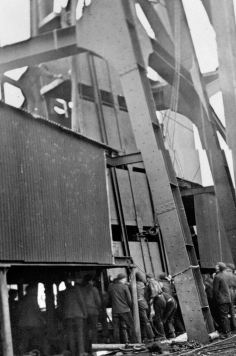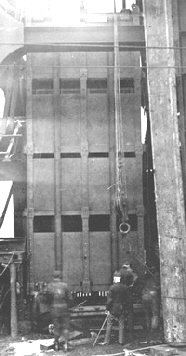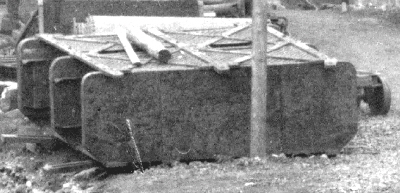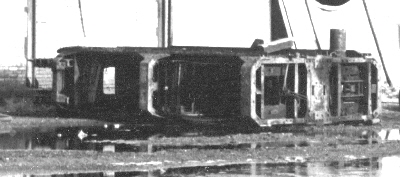
Section under development
Until 1900, the North pit was the main coal winding shaft and a two-deck cage was used until about 1907. With the increased power available from the new winding engine installed in 1904 it was decided to install a four deck cage. This was used until the 1950s modernisation, when a two-deck cage was re-installed.


Installing the East-side four deck cage at the North pit circa 1907 (FoPP/JST)
New four deck cage in position at the North pit circa 1907 (FoPP/JST)
North pit cage details
- 1875 - 1907
- 2 deck
- 2 tubs per deck
- 2 deck simultaneous loading
- 1907 - 1955
- 4 deck
- 2 tubs per deck
- 2 deck simultaneous loading
- 1955 - 1979
- 2 deck
- 1 mine-car per deck
- 1 deck sequential loading
When the colliery was sunk, it was layed out for coal winding at the North shaft only. The South shaft was used for ventilation and emergency egress but not for coal winding. It would have had some form of conveyance but what the configuration was is unknown.
The reason for this arrangement is unclear It may have been simply because the upcast shaft was not normally used for coal winding at this time. Up until the recent introduction of fans, the usual means of ventilation had been by means of a furnace at the bottom of the shaft and suitable shaft-top closure technology had not yet emerged.
Alternatively, it may have been a financial decision by the owners, due to the fall in the price of coal in the 1870s. In the first directors report in 1879, following incorporation of Stanton Ironworks, a comment is made that should the demand of trade require it, the South pit could be upgraded out of profits.
By 1888 the North shaft was operating at maximum capacity and it was decided to upgrade the South shaft to allow coal winding there. Twin-deck cages were installed together with new guides. Although the cage was twin-decked, they only carried one tub per deck and this again may have been a consequence of the use of simple shaft closure bonnets. By 1896 a three-deck cage was being used.
At the end of the 19th century shaft capacity had been reached once more and in 1899 it was decided to completely upgrade the coal winding facilities at the South shaft.
This upgrade happened in 1900, and included a new headstock, a larger and more powerful winder and a brick airlock enclosure for the shaft top. Larger two deck cages with two tubs per deck were installed and were used until the 1920 deepening, when a triple deck cage was introduced. This was later replaced by a four deck cage which in turn was replaced by a two deck cage in the 1950s modernisation.

South pit cage removed during shaft deepening circa 1919 (FoPP/JST)

North pit cage removed following shaft closure circa 1983 - bottom deck nearest, shaft-wall side to the top (FoPP/JST)
South pit cage details
- 1875 - 1888
- unknown
- 1888 - 1900
- 2 deck
- 1 tub per deck
- 1 deck sequential loading
- 1900 - 1919
- 2 deck
- 2 tubs per deck
- 2 deck simultaneous loading
- 1922 - 19??
- 3 deck
- 2 tubs per deck
- 3 deck simultaneous loading
- 19?? - 1955
- 4 deck
- 2 tubs per deck
- 2 deck simultaneous loading
- 1955 - 1979
- 2 deck
- 1 mine-car per deck
- 1 deck sequential loading
TOP
Copyright © 2005 - 2020 J.S. Thatcher
Page updated on:
27 Jul, 2020
at
07:47:21 PM
In case of problems contact: